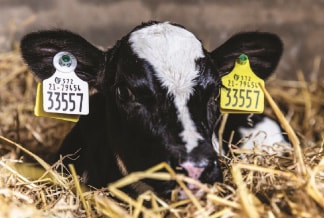From July 1st, 2022, it is a legal requirement for herd keepers to officially identify all newborn calves with a tag set containing an EID tag.
The rule is part of a raft of measures the Department of Agriculture, Food and the Marine has introduced in respect of mandatory EID for cattle.
According to the Minister for Agriculture, Food and the Marine, Charlie McConalogue, the move seeks to “take advantage” of newer technologies to enhance and future-proof the Irish bovine traceability system.
Earlier this year, the DAFM implemented part one of its two-stage Bovine EID implementation strategy.
EID Tag Rule
From January 1st, 2022, the DAFM require all approved bovine tag suppliers to supply an EID tag with all-new tag orders.
Each new tag set will include one EID tag and one tissue tag. EID tags will be white in colour.
The colour of conventional and tissue tags will remain yellow.
As a result, ahead of today’s (July 1st, 2022), deadline, both the DAFM and tag suppliers urged farmers to use up all existing stocks of non-EID tags, in the context of the new regime.
€100/farmer
Last November, the minister announced details of a maximum payment of €100/farmer to support the move to bovine EID.
The minister announced a financial package to the tune of €4.25 million to assist with the transition.
It will calculate payments in 2022 on the number of new EID tag sets purchased from January 1st, 2022, at a rate of €1 per new EID tag set.
In a statement at the time, the minister said:
“There is a maximum payment of €100 per farmer over the life of the scheme. Furthermore, no application process will be required.”
“The scheme is proportionately weighted in favour of smaller producers. Farmers can only order annually the number of new tag sets required commensurate to the number of breeding females in the herd.”
The DAFM intends to operate the scheme over 3 years (2022 to 2024 inclusive). The DAFM has scheduled the first payments, amounting to €2.25 million, in Quarter 4 2022.
McConalogue believes the bovine EID deliver a “substantial” improvement in the bovine identification system for:
- Farmers;
- Livestock marts;
- Slaughter plants;
- Export assembly centres;
- Vets.
Other articles on That’s Farming:





